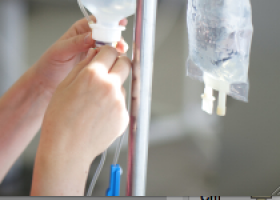
Today, the National Institute for Health and Care Excellence (NICE) has published its Final Appraisal Determination (FAD) recommending carfilzomib in combination with dexamethasone as an option for treating adults with relapsed multiple myeloma (RMM) who have received one prior therapy that does not include bortezomib.
This recommendation is based on the discount agreed in the patient access scheme.
During the Health Technology Assessment, NICE, alongside patients, Myeloma UK, and healthcare professionals, recognised carfilzomib as a much needed treatment option after relapse and a cost-effective use of NHS resources.
“It is great news that carfilzomib, in combination with dexamethasone, has been approved by NICE. The decision means that myeloma patients who have not previously received bortezomib will have the option of accessing a new and effective proteasome inhibitor at first relapse,” said Kate Morgan, Policy and Public Affairs Manager, Myeloma UK. “As carfilzomib and dexamethasone has been shown to be effective in prolonging survival in relapsed myeloma patients, with limited negative impact on quality of life, it is very important for patients to have access to it on the NHS.”
NICE heard from a patient expert that people taking carfilzomib find the treatment tolerable and that it does not appear to be associated with neuropathic adverse reactions to the same extent as standard treatment.
The NICE committee concluded there is a need for effective treatment options after relapse and that patients and clinicians would like to have access to carfilzomib because it offers quality-of-life improvements over current treatment options.
“Clinical trial data have proven that, in combination with dexamethasone, carfilzomib is superior to bortezomib, having doubled progression-free survival and significantly improved overall survival for patients who have relapsed,” said Professor Graham Jackson, Consultant Haematologist, Freeman Hospital, Newcastle. “With the relapsing and progressive nature of multiple myeloma, there is a high unmet need for more effective treatments, and as a clinician, I am encouraged to see advances being made that may benefit my patients.”
“We have worked collaboratively with NICE to identify and submit an optimal submission package for carfilzomib and we are very pleased with the outcome today,” said Tony Patrikios, Executive Medical Director at Amgen UK and Ireland. “With proven evidence to prolong progression-free survival, we see carfilzomib as backbone therapy for the management of relapsed multiple myeloma. We know that time free of disease is precious and are committed to advancing care for people with this difficult-to-treat blood cancer.”
The key evidence to support the use of carfilzomib in combination with dexamethasone in the treatment of adults with RMM, was based on the large Phase 3 randomised study, ENDEAVOR (n=929).
This first ever head-to-head clinical trial comparing two proteasome inhibitors showed that adults treated with carfilzomib plus dexamethasone lived almost twice as long without their cancer progressing (progression-free survival; PFS) compared to adults who received bortezomib plus dexamethasone, the current standard of care (18.7 months vs. 9.4 months).
Moreover, in a planned interim analysis of overall survival (OS), carfilzomib and dexamethasone (Kd) reduced the risk of death by 21 percent compared to bortezomib and dexamethasone (Vd), resulting in a 7.6 month survival benefit (median OS 47.6 months for Kd versus 40.0 for Vd, HR=0.79; 95 percent CI: 0.65 – 0.96; p=0.01).
These benefits were also observed in the subgroup considered by NICE, in patients who have received one prior therapy and no prior bortezomib.
Together with ENDEAVOR, data from the Phase 3 randomised study, ASPIRE (n=792) were also reviewed.
The study showed that carfilzomib with lenalidomide and dexamethasone (KRd) was effective at prolonging progression-free survival, compared with lenalidomide and dexamethasone (Rd) alone in patients with relapsed multiple myeloma (26.3 months KRd vs 17.6 Rd).
NICE considered KRd compared to Rd in patients at first relapse who had received prior bortezomib, and in patients who had received two or more prior lines of therapy, but did not recommend KRd for either of these groups of patients.
In the UK, it is estimated that there are approximately 17,500 people living with myeloma and it accounts for around two percent of all cancers.
With approximately 5,500 new cases diagnosed each year, the UK incidence rate is ninth highest in Europe for males and eight highest for females.
The UK registry data suggests that on relapse, median survival is less than two years from the start of second-line therapy and around one year from the start of third-line therapy.
Carfilzomib is available with immediate effect via interim funding arrangements in England and in Wales.
Subject to NICE issuing positive Final Guidance, interim funding for carfilzomib in England will be available until 90 days after NICE Final Guidance is issued, whereupon funding will switch permanently to baseline commissioning budgets.
This guidance is contingent upon Amgen UK providing carfilzomib to the NHS within the terms of an agreed patient access scheme.
Source: Amgen